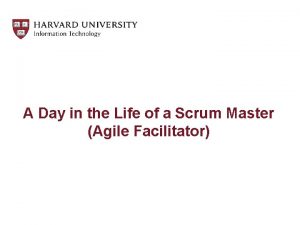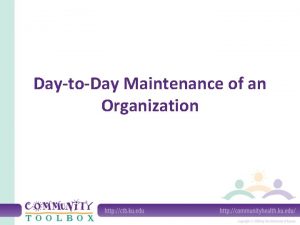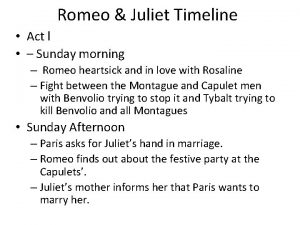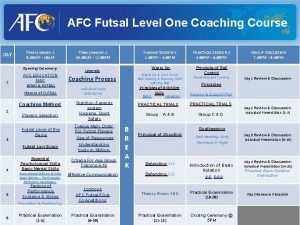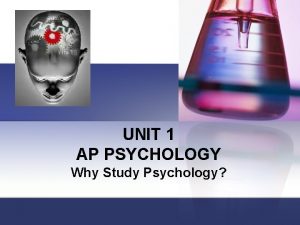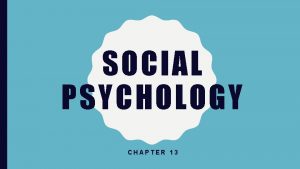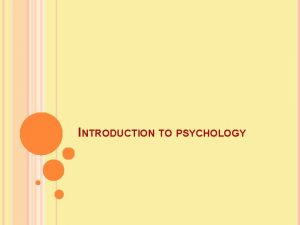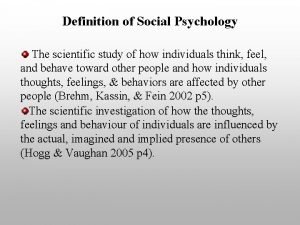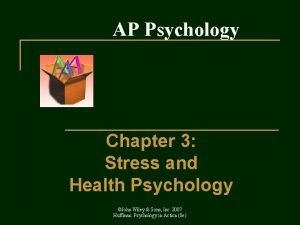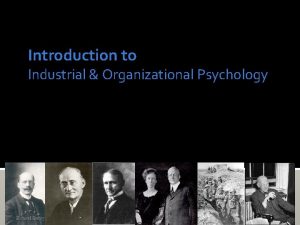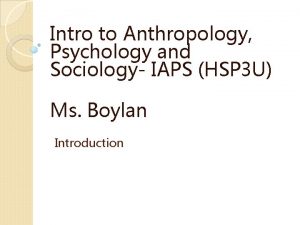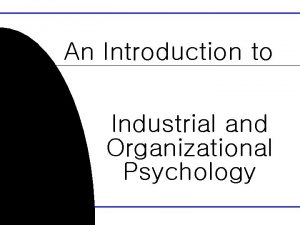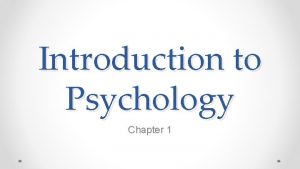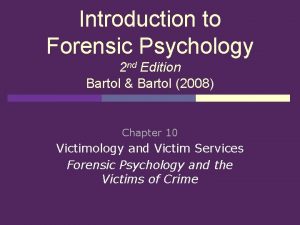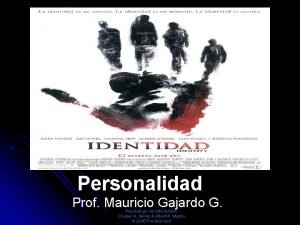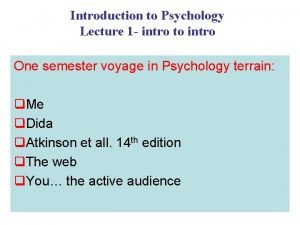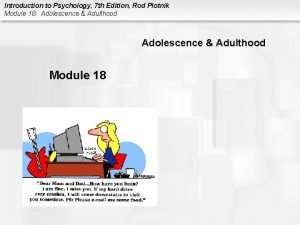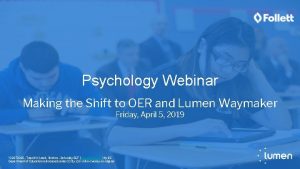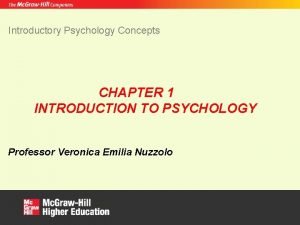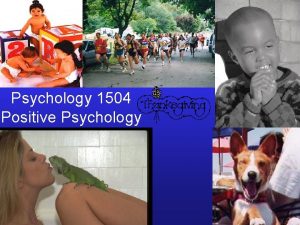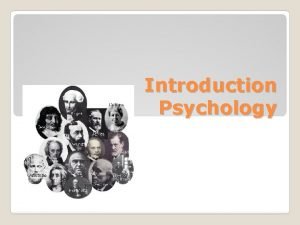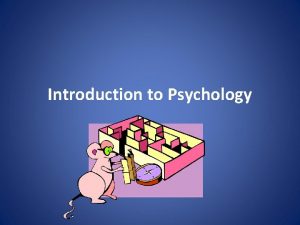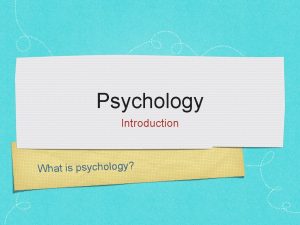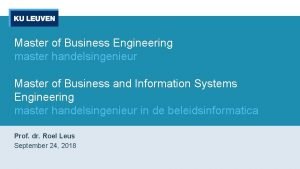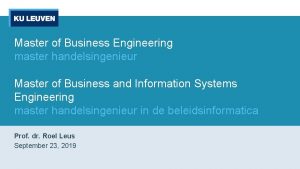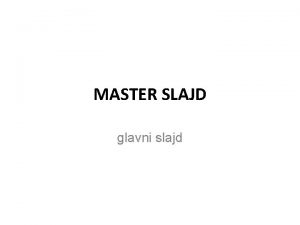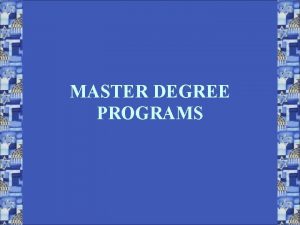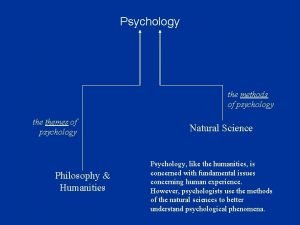Introduction to Master in Psychology Introduction day 31








































- Slides: 40

Introduction to Master in Psychology Introduction day 31 th august 2015

Welcome • • • Getting to know each other Programme Problem Based Learning (PBL) Practicalities Buddies Questions

Who am I? Jolijn Serto MSc. serto@fsw. eur. nl Phone number 010 408 8830 Room T 13 -16 Coordinator of International Master in Psychology Internship coordinator

Getting to know each other

Chairman Organisational Psychology: Prof. Arnold Bakker Brain and Cognition: Prof. Rolf Zwaan Human Learning and Performance: Prof. Fred Paas

About your group • • 25 degree students Representatives of 15 countries

Getting to know each other • Speedmeeting • We will split the group in half and the lower row will move one place to the right after a 1, 5 minute meeting with the person in front of you. • Introduce yourself to the person sitting directly across the table. And find answers on the following questions:

Questions (1) • • If you could go back in time to change one thing what would it be? What would your dream job be? What is your favorite topic in psychology? If you could learn one random skill, what would you learn? Do you think people are basically bad or basically good? What do you think we could do to best improve the educational system? What are some of your favorite websites?

Questions (2) • • What’s something you wish everyone knew about you? What’s one of the strangest things you’ve ever done? How did you get into Psychology? What is/was your first impression of Rotterdam? Who are some people you’d like to meet someday? Do you think people can control their own destiny? What is the biggest lie you’ve ever told?

About the programme

Three Master Specialisations 1. Human Learning and Performance 2. Brain and Cognition 3. Organisational Psychology • Curriculum • • • Three courses and practicals of your specialisation All: Applied Multivariate Data Analysis Thesis and optional internship

Curriculum Brain and Cognition

Curriculum Organizational Psychology

Curriculum Psychology of Human Learning and Performance

Teaching method Problem Based Learning Advantages • You will acquire knowledge that is directly useable and applicable; • You will learn to analyse and solve problems; • The method gives you a great deal of responsibility for structuring your own study, thus requiring a considerable degree of independence. Advantages • Small groups (10 -12 students); • Substantive discussions on content of programme; • Tutorial meetings 3 hours per week (compulsory). • Structured problem analysis seven-step approach

Teaching method Problem Based Learning • In PBL the problem is the starting point, before all other input. • By starting with a problem we are: • learning in a meaningful context • activating prior knowledge • Integrating knowledge

An example A newspaper is better than a magazine. A seashore is a better place than the street. At first, it is better to run than to walk. You may have to try several times. It takes some skill but it's easy to learn. Even young children can enjoy it. Once successful, complications are minimal. Birds seldom get too close. Rain however, soaks in very fast. Too many people doing the same thing can also cause problems. One needs lots of room. If there are no complications, it can be very peaceful. A rock will serve as an anchor. If things break loose from it, however, you will not get a second chance.


How does it work? The 7 step approach

Example • Nicole is a rower. When in the boat alongside her Skadi-8 team mates she puts in a good effort, but when on her own in her single-skull, she tends to move up a gear. • Peter's on the choir. He's not been there long and if asked to sing solo, he often messes up. But in community singing he always does a lot better.

Step 1: Clarifying unfamiliar terms Unclear terms and concepts in a problem are clarified, so that every group member understands the information that is given.

Step 2: Problem definition The problem is defined in the form of one or more questions. The group has to agree upon the phenomena that need to be explained.

Step 3: Brainstorm The preexisting knowledge of group members is activated. This process entails the generation of as many explanations and hypotheses as possible. The ideas of all group members are collected, without critical analysis.

Step 4: Analyzing the problem Explanations and hypotheses of the group members are discussed in depth and are systematically analyzed. Ideas from the brainstorm are ordered and related to each other.

Step 5: Formulating learning goals Based on things that are not clear yet or that can not be explained from the problem analyses, questions are formulated that form the foundation for the study activities of the group members.

Skills of the chair and the scribe • As a chair: - your main task is to lead the discussion and direct the interaction between group members - you ask, summarize, stimulate, check • As a scribe: - you support the chair by scribing the contributions of the group (including the unfamiliar terms, problem statements and learning goals) on the white board Tutor: ‘guide on the side’ instead of ‘sage on the stage’

Teaching method Problem Based Learning More about the seven-step approach on: Training on Friday September 4, 12. 30 -16. 00 12: 30 -14: 30 Tinbergen Building H 4 -02 14: 30 -16: 00 VB-01, VB-05, VB-09 Information session on the Problem Based Learning and reading scientific articles PBL reporting practical

Practicalities whereabouts

Roadmap of the year Block Time period Besides lectures + master thesis 1 Introduction activities +internship meeting 2 Mid-term interviews with Jolijn Serto Searching for a research internship (+ optional practical internship) 3 International Dinner Matching with the supervisor 4 Matching with the supervisor Beginning of June Submitting the 1 st version of a complete thesis draft to the supervisor End of June Approval by the 1 st supervisor, thesis off to the 2 nd supervisor End of July Handing in the hard copies of thesis and all forms

Introduction activities this month September 9 Time Venue Activity 15: 30 -17: 30 Rotterdam City Tour Rotterdam Time Venue Activity 18: 45 (provisional) The Maas Pancake boat September 22

Office of Student and Educational Affairs OSEA • • Course timetables Updates regarding issues pertaining the planning of the educational process Assignment to work groups/ tutorials Learning environment Registration for courses Registration for exams Re-sits Check your email regularly! Or forward it. More information on www. psyweb. nl-> OSEA.

Contact information OSEA The education counter on T 13 -08 is open every working day between 8. 30 – 9. 00 and 12. 00 – 15. 00. Joyce Eimers (responsible for the master, including internship and thesis), phone: 010 408 9732 For general queries please consult the various forums, or fill in the OSEA contact form

Study Advisor Martine van der Paal Study Advisor What questions? - Study Advice - Personal circumstances relevant to your studies - Disappointing study results - Combining two studies X - Practical issues (housing, finances, etc) ESSC!!


Roadmap of the day Time Venue Activity 12: 00 -13: 00 Campus Scavenger hunt 13: 00 Sports building Lunch provided* 14: 00 Sports building Closing of scavenger hunt After 14: 00 *B&C Lecture at 13. 00! Heartbeat festival

Flexican & MC SEF en AUDIO ADAM 15: 30 -22: 00 @ Erasmus Plaza Free entrance!

Buddy Programme

Introducing the buddy programme • • Local and international students familiar with the programme and life in Rotterdam Know what you’re going through • • • Help with studying Social events Questions about practicalities

MSc Psychology • • • • Jacky Hooftman (buddy) Kristel de Groot (buddy) Reshma Ramdajal (buddy) Caroline Walvoord Emily Thomas Ranjing Li Yeon-Joon Park Inayati Khaerinnisaa Rosa Schaab Wilken Wehrt Cinzia de Marco Marina Monogyiou Maria Tsilidou Christos Konstantinidis Emmalotta Korhonen • • • • William Pearson Youyun Li Jialu Ye Deeksha Bhaskar Dalal Alostad Sofia Schlamp Jolvie Kengue Mahoungou Sofia Pinto Martins Oana Catalina Salcescu Vasilis Koutsonas Alice Mangoyan Ida Vahala Mariam Abubakar

Thank you!
 Day 1 day 2 day 3 day 4
Day 1 day 2 day 3 day 4 Day 1 day 2 day 817
Day 1 day 2 day 817 A day in the life of a scrum master
A day in the life of a scrum master William beanes elementary
William beanes elementary Ocean apart day after day
Ocean apart day after day Day to day maintenance
Day to day maintenance Physical science chapter 6 review answers
Physical science chapter 6 review answers I don't know about tomorrow
I don't know about tomorrow Romeo and juliet timeline answer key
Romeo and juliet timeline answer key Growing day by day
Growing day by day Seed germination inhibitors examples
Seed germination inhibitors examples Conclusion of seed germination
Conclusion of seed germination Role of transpiration
Role of transpiration I live for jesus day after day
I live for jesus day after day Rising he justified freely forever
Rising he justified freely forever Day one day one noodle ss2
Day one day one noodle ss2 Tactique futsal
Tactique futsal Positive psychology ap psychology definition
Positive psychology ap psychology definition Social psychology examples
Social psychology examples Fundamental attribution error ap psychology
Fundamental attribution error ap psychology Applied psychology vs psychology
Applied psychology vs psychology Social psychology is the scientific study of:
Social psychology is the scientific study of: Health psychology definition ap psychology
Health psychology definition ap psychology Quiz master introduction
Quiz master introduction Introduction to organizational psychology
Introduction to organizational psychology Anthropology psychology and sociology
Anthropology psychology and sociology Introduction to industrial psychology
Introduction to industrial psychology Introduction to psychology chapter 1
Introduction to psychology chapter 1 Introduction to health psychology
Introduction to health psychology Introduction to forensic psychology bartol pdf
Introduction to forensic psychology bartol pdf Venn diagram anthropology sociology psychology
Venn diagram anthropology sociology psychology Introducción a la psicología psychology: an introduction
Introducción a la psicología psychology: an introduction Introduction to psychology lecture
Introduction to psychology lecture Introduction to psychology rod plotnik
Introduction to psychology rod plotnik Introduction to anthropology psychology and sociology
Introduction to anthropology psychology and sociology Introduction to psychology chapter 1
Introduction to psychology chapter 1 Psychology ia introduction
Psychology ia introduction Unit 1 introduction to psychology
Unit 1 introduction to psychology Unit 1 introduction to psychology
Unit 1 introduction to psychology Lumen ohm activation code
Lumen ohm activation code Introduction to psychology chapter 1
Introduction to psychology chapter 1


